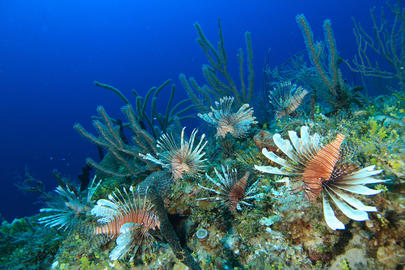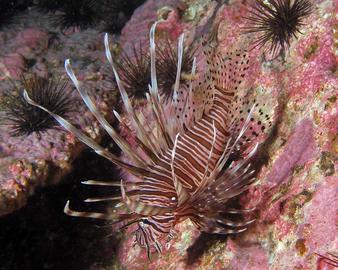This seminal publication was created by REEF and our collaborators at NOAA, ICRI, the United Nations Environment Programme, Caribbean Environment Programme, SPAW-RAC, and the over 40 participants of the 2010 Caribbean Regional Lionfish Workshop. The guide provides best practices for lionfish control and management, including control strategies, outreach and education, research, monitoring, legal considerations, and ideas for securing resources and partnerships.
REEF, in collaboration with the University of Virgin Islands and Buck Island National Monument, took a major step last week in a novel study to better understand lionfish movement and factors that may influence that movement. The study, focusing on a 2km area of patch and continuous reef in St Croix, used innovative underwater tagging techniques pioneered by REEF to surgically implant transmitters into invasive lionfish within an array of receivers, allowing the team to pinpoint movement of the fish over the next year.
This paper examined the genetic source of the invasive Indo-Pacific lionfish in the Bahamas. Many of the samples used in this study were collected during REEF's lionfish research trips during 2007 and 2008. Two species, Pterois volitans and P. miles, were well established along the United States east coast before the first lionfish were reported from the Bahamas in 2004, where they quickly dispersed throughout the archipelago by 2007.
The impacts of invasive lionfish (Pterois volitans/miles) on native coral reef populations in the Western Atlantic Ocean and Caribbean Sea can be enormous. However, how much lionfish differ from native predators and whether their effects outweigh the abundant mesopredators that occupy many reefs invite continued examination. The authors of this paper present empirical evidence from Caribbean Panama and beyond, suggesting that lionfish are less abundant than native mesopredators (e.g. small seabass).
Information on fish movement and growth is primarily obtained through the marking and tracking of individuals with external tags, which are usually affixed to anesthetized individuals at the surface. However, the quantity and quality of data obtained by this method is often limited by small sample sizes owing to the time associated with the tagging process, high rates of tagging-related mortality, and displacement of tagged individuals from the initial capture location.
There is growing concern that lionfish will affect the structure and function of invaded marine ecosystems. Lead author, Stephanie Green, from Simon Fraser University (SFU), along with REEF Director of Special Projects, Lad Akins and other co-authors Aleks Maljković (SFU), and Isabelle Côté (SFU), documented a dramatic 65% decline in 42 species of reef fish eaten by lionfish over a two year period.
REEF Director of Special Projects, Lad Akins, has co-authored several recent scientific publications on the invasive lionfish in the western Atlantic, including:
South Water Caye Marine Reserve, in southern Belize, is a unique mangrove/coral reef habitat and home to several endemic species including the Social Wrasse and the Maya Hamlet. The goal of this trip is to study the effects of stressors such as invasive lionfish and habitat loss on this remote area of the Mesoamerican barrier reef system, with a special focus on how these impacts are affecting species that are not found anywhere else in the Caribbean. Participants will work with local partners to conduct fish surveys as well as lionfish research and removals.
Predicting and mitigating the effects of invasive Indo-Pacific lionfish Pterois volitans on Caribbean fish communities requires a thorough understanding of the species’ predation behaviour in the invaded range, including the types and amounts of prey consumed and how foraging patterns vary in relation to extrinsic conditions. We studied the activity levels and prey consumption rates of lionfish on 12 shallow coral reefs in the Bahamas in relation to time of day and prey availability.



